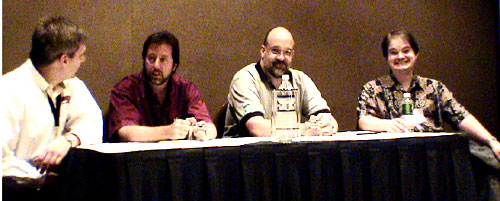Since I’m new to this whole gaming without batteries thing, I figured I should just jump right in and figure out where it’s headed. I was in the mood for some Cassandrean predictions for the fate of the gaming industry so I headed over to a seminar on that very topic. “Future Trends in Gaming” brought together James Ernest (), Mike Gray (Hasbro), Jordan Weisman (WizKids), Dave Williams (Alderac Entertainment Group), and Christian Moore (Decipher) together to talk about the current state of the industry – and try to sketch out a picture of where it’s going.

From left to right: Williams, Weisman, Gray, and Ernest – Moore arrived later.
The problems with panels that are as vaguely titled as this one is that you need a moderator to keep things focused and ask interesting questions. You need a whip-smart, provocative MC who’ll bounce ideas off the panelists and, in very subtle and entirely friendly ways, pit them against each other. This panel was a great opportunity to delve into the minds of five men who are in very different market places in the games industry. I mean, you have Mike Gray, Senior Director of Product Design at Hasbro, sitting right next to James “Mr. Cheapass Games” Ernest himself. What an unparalled opportunity for playing one’s ethics and perceptions off the other’s for the edification of all.
Well, that didn’t happen. The most interesting topic that cropped up was the idea of where to innovate, where the to improve the quality. Most of the panelists – with the possible exception of Ernest, who kept mum – seemed to think that games were just getting better, all the time, in all different ways. Gray pointed out that miniatures and components in games were getting ever more sophisticated – he gave the example of the game Clue. When we played ti as kids, he noted, we played with a purple pawn to represent Dr. Plum. If you go buy the game now, you get a plastic little figure of Dr. Plum, with his little shoes and his purple suit. That’s great – if ultimately unneccessary.
Another way the U.S. games industry is growing up is in marketing. WizKids had announced at their press conference that they were co-branding (is that the right term?) Creepy Freaks with a new snack product put out by Dannon. They discussed with admiration the phenomenon of Pokémon and Yu-Gi-Oh!: “That media saturation hasn’t happened in the West,” Moore explained. “The media is a commercial for the product.” One fellow in the back asked in consternation, “But are you guys saying that’s good?” The panel broke out into laughter.
Weisman made a good point when he said that humans will always have a need for face to face contact with other humans – and that’s the essence of the kinds of games they make. “It’s not passive,” Weisman emphasized. Williams and Gray obviously agreed. “You have to bring something, add something to the game.”
But it seems strange to me that while they were praising good game design, innovation, and, above all, interactivity, some of the trends they discussed arguably remove those elements from games, making them, in effect, more passive: ‘Make them easier!” and “Make them prettier!” and “Make them appear on every channel, in every aisle, in movies, everywhere!” are mantras I heard quite often, and values that were upheald by the panelists. The attitude that Gray, as a representative of Hasbro, espoused – that gamers always need something fresh, something new, something different – was a trend in so far as nearly everyone agreed with him.
One who didn’t is the game industry’s enfant terrible and iconic rebel, James Ernest. I caught up with after the panel – he was nursing a sore throat and participated only minimally in the overall discussion – and spoke with him a little about the way he was running his company – very differently from the other guys.
“When Gray said that, I was shaking my head,” he said. “I don’t want new stuff all the time. There’s a fan mentality that’s different from a consumer mentality.” But then, he caters to a different kind of game consumer – not the Walmart-hopping Moms that Hasbro courts, but the down-and-dirty gamer guys and gals who appreciate Cheapass Games’ ethic: cheap, quick, and devastatingly fun. The designs are stripped-down. “I’m selling imagination,” he said with a smile. “Kids like it because it’s got indie cred – because it’s not all pretty.”
He clearly likes being the indie guy in the group. “We don’t have to be slaves to Walmart,” he explained. “I don’t ever want to run a big company. I just want to make games.”
And that’s ultimately what all of them want to do – all the panelists love games, and clearly their only wish is to be able to continue making more. They just have very different methods of doing so.
The future? We didn’t really get that far. But as Ernest pointed out, the conglomeration of the industry heavy-hitters leaves a lot more space for guys like him. “Are you threatening to them?” I asked. He vehemently shook his head. “Of course not. We’re all friends. We support eachother. And,” he added with a wry smile, “we all know we’re really up against the movie industry.”